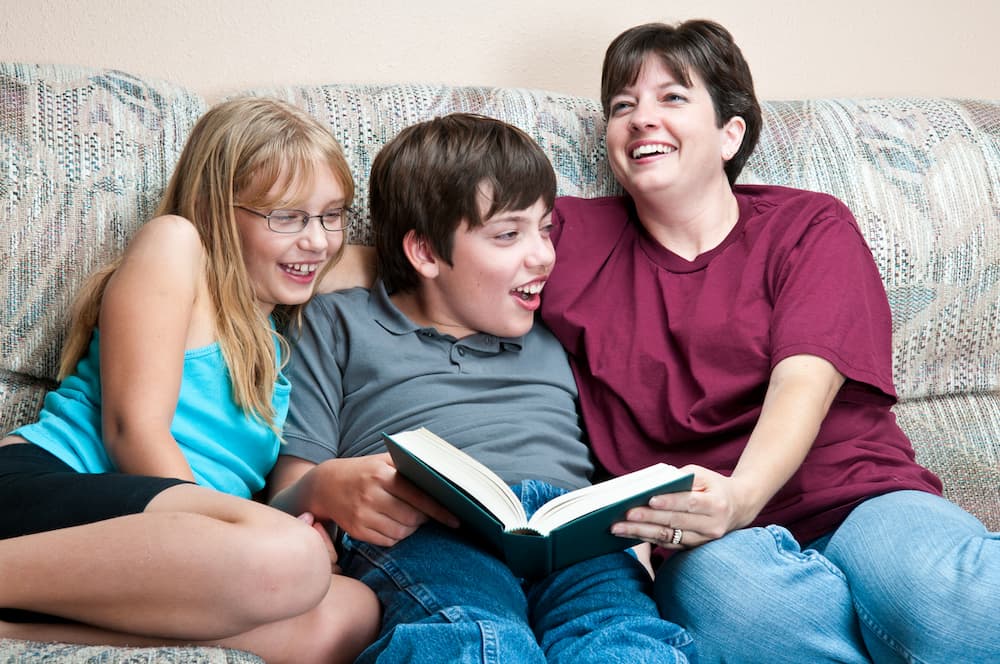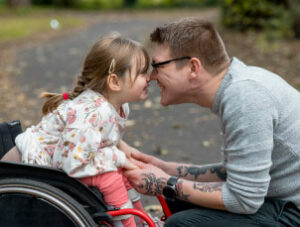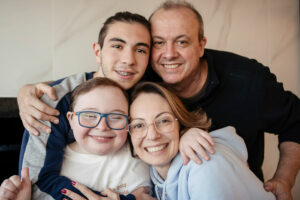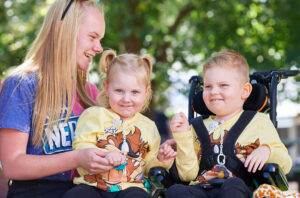
ਵਿੱਤੀ ਸਹਾਇਤਾ
ਅਪੰਗਤਾ ਵਾਲੇ ਬੱਚਿਆਂ ਦੇ ਪਰਿਵਾਰਾਂ ਲਈ ਵਿੱਤੀ ਸਹਾਇਤਾ ਦੀ ਇੱਕ ਲੜੀ ਉਪਲਬਧ ਹੈ ਅਤੇ ਨਾਲ ਹੀ ਸਹਾਇਤਾ ਜੋ ਸਾਰੇ ਪਰਿਵਾਰਾਂ ਲਈ ਉਪਲਬਧ ਹੈ।
ਮੈਂ ਕਿੱਥੋਂ ਸ਼ੁਰੂ ਕਰਾਂ?
ਹਰ ਪਰਿਵਾਰ ਵੱਖਰਾ ਹੁੰਦਾ ਹੈ ਅਤੇ ਵਿੱਤੀ ਹੁੰਦਾ ਹੈ ਤੁਹਾਡੇ ਲਈ ਉਪਲਬਧ ਸਹਾਇਤਾ ਤੁਹਾਡੇ ਵਿਅਕਤੀਗਤ ਹਾਲਾਤਾਂ 'ਤੇ ਨਿਰਭਰ ਕਰੇਗੀ। ਇਹ ਕਰ ਸਕਦਾ ਹੈ ਗੁੰਝਲਦਾਰ ਤਰੀਕੇ ਨਾਲ ਇਹ ਪਤਾ ਲਗਾਉਣਾ ਕਿ ਤੁਸੀਂ ਅਤੇ ਤੁਹਾਡਾ ਪਰਿਵਾਰ ਕਿਹੜੀ ਸਹਾਇਤਾ ਯੋਗ ਹੋ ਸਕਦੇ ਹੋ ਲਈ। ਜਾਣਕਾਰੀ ਅਤੇ ਸਲਾਹ ਵਾਸਤੇ, ਸੰਪਰਕ ਕਰਕੇ ਸ਼ੁਰੂ ਕਰੋ:
ਅਪੰਗਤਾ, ਬਿਮਾਰੀ ਅਤੇ ਸੰਭਾਲ ਕਰਤਾ ਲਾਈਨ
132 717 'ਤੇ ਕਾਲ ਕਰੋ
ਸਰਵਿਸਿਜ਼ ਆਸਟਰੇਲੀਆ
ਔਨਲਾਈਨ ਸੇਵਾਵਾਂ ਸਹਾਇਤਾ ਹੌਟਲਾਈਨ
MyGov ਅਤੇ Services Australia ਸਰਕਾਰੀ ਆਨਲਾਈਨ ਸੇਵਾਵਾਂ ਜਿਵੇਂ ਕਿ ਮੈਡੀਕੇਅਰ, ਸੈਂਟਰਲਿੰਕ ਅਤੇ ਐਨਡੀਆਈਐਸ ਤੱਕ ਪਹੁੰਚ ਕਰਨ ਲਈ ਕੇਂਦਰੀ ਬਿੰਦੂ ਹਨ। MyGov ਤੱਕ ਪਹੁੰਚ ਕਰਨ ਲਈ ਤੁਹਾਨੂੰ ਪਹਿਲਾਂ ਰਜਿਸਟਰ ਕਰਨ ਦੀ ਲੋੜ ਹੈ।
ਅਪੰਗਤਾ ਵਾਲੇ ਬੱਚਿਆਂ ਵਾਲੇ ਪਰਿਵਾਰਾਂ ਵਾਸਤੇ ਸਹਾਇਤਾ
ਸੰਭਾਲ ਕਰਤਾ ਭੱਤਾ
ਇਹ ਉਹਨਾਂ ਲੋਕਾਂ ਵਾਸਤੇ ਲਗਭਗ $ 140 ਪ੍ਰਤੀ ਪੰਦਰਵਾੜੇ ਦੀ ਅਦਾਇਗੀ ਹੈ ਜੋ ਕਿਸੇ ਅਪੰਗਤਾ, ਡਾਕਟਰੀ ਸਥਿਤੀ, ਜਾਂ ਕਮਜ਼ੋਰ ਉਮਰ ਦੇ ਕਿਸੇ ਵਿਅਕਤੀ ਨੂੰ ਰੋਜ਼ਾਨਾ ਦੇਖਭਾਲ ਅਤੇ ਸਹਾਇਤਾ ਪ੍ਰਦਾਨ ਕਰਦੇ ਹਨ। 16 ਸਾਲ ਤੋਂ ਘੱਟ ਉਮਰ ਦੇ ਬੱਚੇ ਜਿਨ੍ਹਾਂ ਦੀ ਦੇਖਭਾਲ ਕੀਤੀ ਜਾ ਰਹੀ ਹੈ, ਉਨ੍ਹਾਂ ਨੂੰ ਵੀ ਹੈਲਥ ਕੇਅਰ ਕਾਰਡ ਮਿਲਦਾ ਹੈ।
ਸੰਭਾਲ ਕਰਤਾ ਭੱਤਾ ਪ੍ਰਾਪਤ ਕਰਨ ਲਈ, ਤੁਹਾਨੂੰ ਲਾਜ਼ਮੀ ਤੌਰ 'ਤੇ ਇੱਕ ਆਸਟਰੇਲੀਆਈ ਵਸਨੀਕ ਹੋਣਾ ਚਾਹੀਦਾ ਹੈ, ਅਤੇ ਤੁਹਾਡੀ ਅਤੇ ਤੁਹਾਡੇ ਸਾਥੀ ਦੀ ਸੰਯੁਕਤ ਆਮਦਨ ਪ੍ਰਤੀ ਸਾਲ $250,000 ਤੋਂ ਘੱਟ ਹੋਣੀ ਚਾਹੀਦੀ ਹੈ। ਤੁਸੀਂ ਹਰੇਕ ਯੋਗ ਵਿਅਕਤੀ ਲਈ ਇਹ ਭੱਤਾ ਪ੍ਰਾਪਤ ਕਰ ਸਕਦੇ ਹੋ ਜਿਸਦੀ ਤੁਸੀਂ ਦੇਖਭਾਲ ਕਰਦੇ ਹੋ। ਇਸਦਾ ਮਤਲਬ ਹੈ ਕਿ ਜੇ ਤੁਹਾਡੇ ਕੋਲ ਅਪੰਗਤਾ ਵਾਲੇ ਇੱਕ ਤੋਂ ਵੱਧ ਬੱਚੇ ਹਨ, ਤਾਂ ਤੁਸੀਂ ਹਰੇਕ ਯੋਗ ਬੱਚੇ ਲਈ ਭੱਤਾ ਪ੍ਰਾਪਤ ਕਰਦੇ ਹੋ। ਜੇ ਤੁਹਾਡੇ ਬਹੁਤ ਸਾਰੇ ਬੱਚੇ ਹਨ ਜੋ ਸੀਮਾ ਨੂੰ ਪੂਰੀ ਤਰ੍ਹਾਂ ਪੂਰਾ ਨਹੀਂ ਕਰਦੇ ਹਨ, ਤਾਂ ਉਨ੍ਹਾਂ ਦੀਆਂ ਸਾਂਝੀਆਂ ਦੇਖਭਾਲ ਦੀਆਂ ਲੋੜਾਂ ਦਾ ਮਤਲਬ ਇਹ ਹੋ ਸਕਦਾ ਹੈ ਕਿ ਤੁਸੀਂ ਅਜੇ ਵੀ ਸੰਭਾਲ ਕਰਤਾ ਭੱਤਾ ਪ੍ਰਾਪਤ ਕਰਨ ਦੇ ਯੋਗ ਹੋ।
ਸੰਭਾਲ ਕਰਤਾ ਭੁਗਤਾਨ
ਇਹ $ 1,000 (ਜੋੜਿਆਂ ਲਈ ਵਧੇਰੇ) ਤੱਕ ਦਾ ਪੰਦਰਵਾੜਾ ਭੁਗਤਾਨ ਹੈ. ਇਹ ਉਹਨਾਂ ਲੋਕਾਂ ਵਾਸਤੇ ਹੈ ਜੋ ਕਿਸੇ ਅਪੰਗਤਾ, ਡਾਕਟਰੀ ਅਵਸਥਾ ਜਾਂ ਕਮਜ਼ੋਰ ਉਮਰ ਵਾਲੇ ਕਿਸੇ ਵਿਅਕਤੀ ਨੂੰ ਨਿਰੰਤਰ ਦੇਖਭਾਲ ਦੀ ਲੋੜ ਵਾਲੇ ਕਿਸੇ ਵਿਅਕਤੀ ਨੂੰ ਕਾਫ਼ੀ ਰੋਜ਼ਾਨਾ ਦੇਖਭਾਲ ਅਤੇ ਸਹਾਇਤਾ ਪ੍ਰਦਾਨ ਕਰਦੇ ਹਨ। ਜੇ ਤੁਸੀਂ ਸੰਭਾਲ ਕਰਤਾ ਭੁਗਤਾਨ ਲਈ ਯੋਗਤਾ ਪ੍ਰਾਪਤ ਕਰਦੇ ਹੋ ਤਾਂ ਤੁਹਾਨੂੰ ਸੰਭਾਲ ਕਰਤਾ ਭੱਤਾ ਵੀ ਪ੍ਰਾਪਤ ਹੋਵੇਗਾ।
ਸੰਭਾਲ ਕਰਤਾ ਭੁਗਤਾਨ ਪ੍ਰਾਪਤ ਕਰਨ ਲਈ, ਤੁਹਾਨੂੰ ਲਾਜ਼ਮੀ ਤੌਰ 'ਤੇ ਇੱਕ ਆਸਟਰੇਲੀਆਈ ਵਸਨੀਕ ਹੋਣਾ ਚਾਹੀਦਾ ਹੈ ਅਤੇ ਲਗਭਗ $60,000 (ਸਿੰਗਲ) ਜਾਂ $92,000 (ਜੋੜਾ) ਦੇ ਕਟ-ਆਫ ਪੁਆਇੰਟ ਤੋਂ ਘੱਟ ਕਮਾਉਣਾ ਚਾਹੀਦਾ ਹੈ। ਤੁਸੀਂ ਅਤੇ ਤੁਹਾਡੇ ਸਾਥੀ ਦੀ ਕਮਾਈ 'ਤੇ ਨਿਰਭਰ ਕਰਦੇ ਹੋਏ, ਤੁਹਾਨੂੰ ਕਿੰਨਾ ਪ੍ਰਾਪਤ ਹੁੰਦਾ ਹੈ, ਇਸ ਨੂੰ ਮਾਪਿਆ ਜਾਵੇਗਾ।
ਸੰਭਾਲ ਕਰਤਾ ਭੁਗਤਾਨ ਲਈ ਅਰਜ਼ੀ ਦਿਓ
ਸੰਭਾਲ ਕਰਤਾ ਪੂਰਕ
ਇਹ $ 600 ਦੀ ਸਾਲਾਨਾ ਇਕਮੁਸ਼ਤ ਅਦਾਇਗੀ ਹੈ. ਜੇ ਤੁਸੀਂ ਸੰਭਾਲ ਕਰਤਾ ਭੱਤਾ ਜਾਂ ਸੰਭਾਲ ਕਰਤਾ ਭੁਗਤਾਨ ਪ੍ਰਾਪਤ ਕਰ ਰਹੇ ਹੋ ਤਾਂ ਤੁਹਾਨੂੰ ਸੰਭਾਲ ਕਰਤਾ ਪੂਰਕ ਆਪਣੇ ਆਪ ਮਿਲ ਜਾਵੇਗਾ।
ਸੰਭਾਲ ਕਰਤਾ ਪੂਰਕ ਵਾਸਤੇ ਅਰਜ਼ੀ ਦਿਓ
ਬਾਲ ਅਪੰਗਤਾ ਸਹਾਇਤਾ ਭੁਗਤਾਨ
ਇਹ 1 ਜੁਲਾਈ ਨੂੰ $ 1,000 ਦੀ ਸਾਲਾਨਾ ਇੱਕਮੁਸ਼ਤ ਅਦਾਇਗੀ ਹੈ ਜੋ ਅਪੰਗਤਾ ਵਾਲੇ ਬੱਚੇ ਦੀ ਦੇਖਭਾਲ ਦੇ ਖਰਚਿਆਂ ਵਿੱਚ ਸਹਾਇਤਾ ਕਰਦੀ ਹੈ। ਜੇ ਤੁਸੀਂ ਸੰਭਾਲ ਕਰਤਾ ਭੱਤਾ ਜਾਂ ਸੰਭਾਲ ਕਰਤਾ ਭੁਗਤਾਨ ਪ੍ਰਾਪਤ ਕਰ ਰਹੇ ਹੋ, ਅਤੇ ਤੁਸੀਂ 16 ਸਾਲ ਤੋਂ ਘੱਟ ਉਮਰ ਦੇ ਬੱਚੇ ਦੀ ਦੇਖਭਾਲ ਕਰ ਰਹੇ ਹੋ ਤਾਂ ਤੁਹਾਨੂੰ ਆਪਣੇ ਆਪ ਬਾਲ ਅਪੰਗਤਾ ਸਹਾਇਤਾ ਭੁਗਤਾਨ ਪ੍ਰਾਪਤ ਹੁੰਦਾ ਹੈ।
ਬਾਲ ਅਪੰਗਤਾ ਸਹਾਇਤਾ ਭੁਗਤਾਨ ਵਾਸਤੇ ਅਰਜ਼ੀ ਦਿਓ
ਕੇਅਰ ਐਡਜਸਟਮੈਂਟ ਭੁਗਤਾਨ
ਕਿਸੇ ਤਬਾਹੀ ਵਾਲੀ ਘਟਨਾ ਤੋਂ ਬਾਅਦ ਪਰਿਵਾਰਾਂ ਦੀ ਸਹਾਇਤਾ ਕਰਨ ਲਈ ਇੱਕਵਾਰ ਭੁਗਤਾਨ ਜਿੱਥੇ ਸੱਤ ਸਾਲ ਤੋਂ ਘੱਟ ਉਮਰ ਦੇ ਬੱਚੇ ਨੂੰ ਗੰਭੀਰ ਅਪੰਗਤਾ ਜਾਂ ਗੰਭੀਰ ਡਾਕਟਰੀ ਸਥਿਤੀ ਦੀ ਪਛਾਣ ਕੀਤੀ ਜਾਂਦੀ ਹੈ। ਤੁਹਾਨੂੰ ਇਸ ਲਈ ਅਰਜ਼ੀ ਦੇਣ ਦੀ ਲੋੜ ਹੈ।
ਕੇਅਰ ਐਡਜਸਟਮੈਂਟ ਭੁਗਤਾਨ ਲਈ ਅਰਜ਼ੀ ਦਿਓ
ਅਲੱਗ-ਥਲੱਗ ਬੱਚਿਆਂ ਲਈ ਸਹਾਇਤਾ ਸਕੀਮ
ਇਹ ਉਹਨਾਂ ਵਿਦਿਆਰਥੀਆਂ ਲਈ ਸਹਾਇਤਾ ਪ੍ਰਦਾਨ ਕਰਦਾ ਹੈ ਜੋ ਭੂਗੋਲਿਕ ਅਲੱਗ-ਥਲੱਗ ਹੋਣ ਕਰਕੇ ਜਾਂ ਉਹਨਾਂ ਦੀ ਅਪੰਗਤਾ ਜਾਂ ਵਿਸ਼ੇਸ਼ ਸਿਹਤ ਲੋੜਾਂ ਕਰਕੇ ਉਚਿਤ ਸਰਕਾਰੀ ਸਕੂਲ ਨਹੀਂ ਜਾ ਸਕਦੇ।
ਅਲੱਗ-ਥਲੱਗ ਬੱਚਿਆਂ ਲਈ ਸਹਾਇਤਾ ਸਕੀਮ ਵਾਸਤੇ ਅਰਜ਼ੀ ਦਿਓ
ਘਰੇਲੂ ਸੰਭਾਲ ਵਿੱਚ
ਇਨ ਹੋਮ ਕੇਅਰ (IHC) ਸ਼ੁਰੂਆਤੀ ਬਚਪਨ ਦੀ ਸਿੱਖਿਆ ਅਤੇ ਸੰਭਾਲ ਦਾ ਇੱਕ ਲਚਕਦਾਰ ਰੂਪ ਹੈ ਜਿੱਥੇ ਇੱਕ ਅਧਿਆਪਕ ਬੱਚੇ ਦੇ ਘਰ ਵਿੱਚ ਸੰਭਾਲ ਪ੍ਰਦਾਨ ਕਰਦਾ ਹੈ। ਇਹ ਉਹਨਾਂ ਪਰਿਵਾਰਾਂ ਤੱਕ ਸੀਮਤ ਹੈ ਜੋ ਦੇਖਭਾਲ ਦੀਆਂ ਹੋਰ ਕਿਸਮਾਂ ਤੱਕ ਪਹੁੰਚ ਨਹੀਂ ਕਰ ਸਕਦੇ। ਇਸ ਵਿੱਚ ਗੁੰਝਲਦਾਰ ਅਪੰਗਤਾ ਵਾਲੇ ਬੱਚੇ ਸ਼ਾਮਲ ਹੋ ਸਕਦੇ ਹਨ ਜੋ ਸ਼ੁਰੂਆਤੀ ਬਚਪਨ ਦੀ ਸਿੱਖਿਆ ਤੱਕ ਕਿਤੇ ਹੋਰ ਪਹੁੰਚ ਨਹੀਂ ਕਰ ਸਕਦੇ।
ਹੋਮ ਕੇਅਰ ਵਿੱਚ - ਸਿੱਖਿਆ ਵਿਭਾਗ, ਆਸਟਰੇਲੀਆਈ ਸਰਕਾਰ
ਸਿਹਤ ਖਰਚਿਆਂ ਨੂੰ ਕਵਰ ਕਰਨ ਲਈ ਸਹਾਇਤਾ
ਮੈਡੀਕੇਅਰ
ਮੈਡੀਕੇਅਰ ਕਿਸੇ ਡਾਕਟਰ ਨੂੰ ਮਿਲਣ, ਦਵਾਈਆਂ ਪ੍ਰਾਪਤ ਕਰਨ ਅਤੇ ਮਾਨਸਿਕ ਸਿਹਤ ਸੰਭਾਲ ਤੱਕ ਪਹੁੰਚ ਕਰਨ ਦੇ ਖਰਚਿਆਂ ਵਿੱਚ ਮਦਦ ਕਰਦਾ ਹੈ।
ਹੈਲਥ ਕੇਅਰ ਕਾਰਡ
ਸਸਤੀ ਦਵਾਈਆਂ ਪ੍ਰਾਪਤ ਕਰਨ ਲਈ ਇੱਕ ਰਿਆਇਤ ਕਾਰਡ ਅਤੇ ਜੇ ਤੁਹਾਨੂੰ ਸੈਂਟਰਲਿੰਕ ਤੋਂ ਭੁਗਤਾਨ ਮਿਲਦਾ ਹੈ ਤਾਂ ਕੁਝ ਛੋਟਾਂ। ਤੁਹਾਨੂੰ ਹੈਲਥ ਕੇਅਰ ਕਾਰਡ ਵਾਸਤੇ ਅਰਜ਼ੀ ਦੇਣ ਦੀ ਲੋੜ ਨਹੀਂ ਹੈ। ਜੇ ਤੁਸੀਂ ਯੋਗ ਹੋ ਤਾਂ ਤੁਹਾਨੂੰ ਇੱਕ ਕਾਰਡ ਪੋਸਟ ਕੀਤਾ ਜਾਂਦਾ ਹੈ।
PBS ਸੁਰੱਖਿਆ ਨੈੱਟ ਕਾਰਡ
ਜਦੋਂ ਤੁਸੀਂ ਸੀਮਾ 'ਤੇ ਪਹੁੰਚ ਜਾਂਦੇ ਹੋ ਤਾਂ ਤੁਸੀਂ ਪੀਬੀਐਸ ਸੇਫਟੀ ਨੈੱਟ ਕਾਰਡ ਲਈ ਅਰਜ਼ੀ ਦੇ ਸਕਦੇ ਹੋ। ਇਹ ਕਾਰਡ ਤੁਹਾਨੂੰ ਬਾਕੀ ਸਾਲ ਲਈ ਸਸਤੀ ਦਵਾਈ ਪ੍ਰਾਪਤ ਕਰਨ ਦਿੰਦਾ ਹੈ।
PBS ਸੁਰੱਖਿਆ ਨੈੱਟ ਕਾਰਡ ਬਾਰੇ ਹੋਰ ਜਾਣੋ
ਸੰਕਰਮਣ ਸਹਾਇਤਾ ਭੁਗਤਾਨ ਸਕੀਮ (CAPS)
ਉਹਨਾਂ ਬੱਚਿਆਂ ਵਾਸਤੇ ਸੰਕਰਮਣ ਉਤਪਾਦਾਂ ਦੀ ਲਾਗਤ ਵਿੱਚ ਮਦਦ ਕਰਨ ਲਈ ਇੱਕ ਸਾਲਾਨਾ ਭੁਗਤਾਨ ਜੋ NDIS ਵਾਸਤੇ ਯੋਗ ਨਹੀਂ ਹਨ।
ਸੰਕਰਮਣ ਸਹਾਇਤਾ ਭੁਗਤਾਨ ਸਕੀਮ (CAPS) ਲਈ ਅਰਜ਼ੀ ਦਿਓ
ਜ਼ਰੂਰੀ ਮੈਡੀਕਲ ਸਾਜ਼ੋ-ਸਾਮਾਨ ਭੁਗਤਾਨ
ਡਾਕਟਰੀ ਸਾਜ਼ੋ-ਸਾਮਾਨ ਜਾਂ ਡਾਕਟਰੀ ਤੌਰ 'ਤੇ ਲੋੜੀਂਦੇ ਹੀਟਿੰਗ ਜਾਂ ਕੂਲਿੰਗ ਨੂੰ ਚਲਾਉਣ ਲਈ ਊਰਜਾ ਖਰਚਿਆਂ ਵਿੱਚ ਮਦਦ ਕਰਨ ਲਈ ਇੱਕ ਸਾਲਾਨਾ ਭੁਗਤਾਨ।
ਜ਼ਰੂਰੀ ਡਾਕਟਰੀ ਸਾਜ਼ੋ-ਸਾਮਾਨ ਦੇ ਭੁਗਤਾਨ ਲਈ ਅਰਜ਼ੀ ਦਿਓ
ਗੁੰਝਲਦਾਰ ਨਿਊਰੋਡੇਵਲਪਮੈਂਟਲ ਡਿਸਆਰਡਰ ਅਤੇ ਯੋਗ ਅਪੰਗਤਾ
ਇਹ ਮੈਡੀਕੇਅਰ ਦਾ ਹਿੱਸਾ ਹੈ ਅਤੇ ਤਸ਼ਖੀਸ ਪ੍ਰਾਪਤ ਕਰਨ ਦੀ ਲਾਗਤ ਵਿੱਚ ਮਦਦ ਕਰ ਸਕਦਾ ਹੈ। ਕਿਸੇ ਮੈਡੀਕਲ ਪ੍ਰੈਕਟੀਸ਼ਨਰ ਤੋਂ ਸਿਫਾਰਸ਼ ਦੀ ਲੋੜ ਹੁੰਦੀ ਹੈ। ਇਹ ਬਾਲ ਰੋਗ ਮਾਹਰ ਜਾਂ ਮਾਹਰ ਦੀ ਲਾਗਤ ਲਈ ਭੁਗਤਾਨ ਕਰਨ ਵਿੱਚ ਮਦਦ ਕਰਦਾ ਹੈ; ਇਹ ਸਹਾਇਕ ਸਿਹਤ ਪੇਸ਼ੇਵਰਾਂ ਤੋਂ ਮੁਲਾਂਕਣਾਂ ਲਈ ਭੁਗਤਾਨ ਕਰਨ ਵਿੱਚ ਵੀ ਮਦਦ ਕਰ ਸਕਦਾ ਹੈ।
ਮਾਨਸਿਕ ਸਿਹਤ ਸੰਭਾਲ ਯੋਜਨਾ
ਇਹ ਇੱਕ ਇਲਾਜ ਯੋਜਨਾ ਹੈ ਜੋ ਤੁਹਾਨੂੰ ਕਿਸੇ ਮਾਨਸਿਕ ਸਿਹਤ ਪੇਸ਼ੇਵਰ ਨਾਲ ਹਰ ਕੈਲੰਡਰ ਸਾਲ ਵਿੱਚ 10 ਸੈਸ਼ਨਾਂ ਦਾ ਦਾਅਵਾ ਕਰਨ ਦਿੰਦੀ ਹੈ। ਸਿਹਤ ਪੇਸ਼ੇਵਰ ਆਪਣੀਆਂ ਫੀਸਾਂ ਨਿਰਧਾਰਤ ਕਰਦੇ ਹਨ। ਜੇ ਉਹ ਥੋਕ ਬਿੱਲ ਦਿੰਦੇ ਹਨ, ਤਾਂ ਤੁਹਾਨੂੰ ਕੁਝ ਵੀ ਭੁਗਤਾਨ ਨਹੀਂ ਕਰਨਾ ਪਵੇਗਾ ਪਰ ਜੇ ਉਹ ਫੀਸ ਲੈਂਦੇ ਹਨ ਤਾਂ ਸਿਰਫ ਕੁਝ ਖਰਚੇ ਕਵਰ ਕੀਤੇ ਜਾਂਦੇ ਹਨ. ਵਧੇਰੇ ਜਾਣਕਾਰੀ ਵਾਸਤੇ ਆਪਣੇ GP ਨੂੰ ਪੁੱਛੋ।
ਬਾਲ ਦੰਦਾਂ ਦੇ ਲਾਭਾਂ ਦੀ ਸਮਾਂ-ਸਾਰਣੀ
ਇਹ ਬੱਚਿਆਂ ਲਈ ਕੁਝ ਦੰਦਾਂ ਦੀਆਂ ਸੇਵਾਵਾਂ ਦੇ ਹਿੱਸੇ ਜਾਂ ਪੂਰੀ ਲਾਗਤ ਨੂੰ ਕਵਰ ਕਰਦਾ ਹੈ ਜੇ ਤੁਹਾਨੂੰ ਕੁਝ ਸਰਕਾਰੀ ਭੁਗਤਾਨ ਮਿਲਦੇ ਹਨ।
ਬਾਲ ਦੰਦਾਂ ਦੇ ਲਾਭਾਂ ਦੀ ਸਮਾਂ-ਸਾਰਣੀ ਬਾਰੇ ਹੋਰ ਜਾਣੋ
ਪਰਿਵਾਰਾਂ ਲਈ ਵਿੱਤੀ ਸਹਾਇਤਾ
ਪਾਲਣ-ਪੋਸ਼ਣ ਭੁਗਤਾਨ
ਇਹ ਮੁੱਖ ਆਮਦਨ ਸਹਾਇਤਾ ਭੁਗਤਾਨ ਹੈ ਜੇ ਤੁਸੀਂ ਕਿਸੇ ਛੋਟੇ ਬੱਚੇ ਦੀ ਮੁੱਖ ਸੰਭਾਲ ਕਰਤਾ ਹੋ ਜੋ 14 ਸਾਲ ਤੋਂ ਘੱਟ ਉਮਰ ਦਾ ਹੈ (ਜੇ ਤੁਸੀਂ ਇਕੱਲੇ ਹੋ), ਜਾਂ ਛੇ ਸਾਲ ਤੋਂ ਘੱਟ ਉਮਰ ਦੇ (ਜੇ ਤੁਹਾਡਾ ਕੋਈ ਸਾਥੀ ਹੈ)। ਇਹ ਭੁਗਤਾਨ ਆਮਦਨ ਅਤੇ ਜਾਇਦਾਦ ਦੀ ਜਾਂਚ ਕੀਤੀ ਜਾਂਦੀ ਹੈ।
ਪਾਲਣ-ਪੋਸ਼ਣ ਭੁਗਤਾਨ ਬਾਰੇ ਹੋਰ ਜਾਣੋ
ਪਰਿਵਾਰਕ ਟੈਕਸ ਲਾਭ
ਇਹ ਇੱਕ ਦੋ-ਭਾਗੀ ਭੁਗਤਾਨ ਹੈ ਜੋ ਇਸ ਵਿੱਚ ਮਦਦ ਕਰਦਾ ਹੈ ਬੱਚਿਆਂ ਦੇ ਪਾਲਣ-ਪੋਸ਼ਣ ਦੀ ਲਾਗਤ:
- ਫੈਮਿਲੀ ਟੈਕਸ ਬੈਨੀਫਿਟ (ਐਫਟੀਬੀ) ਭਾਗ ਏ ਦਾ ਭੁਗਤਾਨ ਪ੍ਰਤੀ ਬੱਚੇ ਕੀਤਾ ਜਾਂਦਾ ਹੈ ਅਤੇ ਰਕਮ ਤੁਹਾਡੇ ਪਰਿਵਾਰ ਦੇ ਹਾਲਾਤਾਂ 'ਤੇ ਨਿਰਭਰ ਕਰਦੀ ਹੈ
- ਫੈਮਿਲੀ ਟੈਕਸ ਬੈਨੀਫਿਟ (FTB) ਭਾਗ B ਦਾ ਭੁਗਤਾਨ ਕੀਤਾ ਜਾਂਦਾ ਹੈ ਜੇ ਤੁਸੀਂ ਇਕੱਲੇ ਮਾਪੇ ਜਾਂ ਗੈਰ-ਮਾਪੇ ਸੰਭਾਲ ਕਰਤਾ, ਦਾਦਾ-ਦਾਦੀ ਸੰਭਾਲ ਕਰਤਾ, ਜਾਂ ਜੇ ਤੁਸੀਂ ਇੱਕ ਮੁੱਖ ਆਮਦਨ ਵਾਲਾ ਜੋੜਾ ਹੋ
ਪਰਿਵਾਰਕ ਟੈਕਸ ਲਾਭ ਬਾਰੇ ਹੋਰ ਜਾਣੋ
ਬਾਲ ਸੰਭਾਲ ਸਬਸਿਡੀ
ਇਹ ਭੁਗਤਾਨ ਬੱਚੇ ਦੀ ਦੇਖਭਾਲ ਦੀ ਲਾਗਤ ਵਿੱਚ ਮਦਦ ਕਰਨ ਲਈ ਹੈ, ਜਿਸ ਵਿੱਚ ਸਕੂਲ ਤੋਂ ਬਾਅਦ ਦੀ ਦੇਖਭਾਲ ਵੀ ਸ਼ਾਮਲ ਹੈ, ਜੇ ਤੁਸੀਂ ਕੰਮ ਕਰ ਰਹੇ ਹੋ, ਕੰਮ ਦੀ ਭਾਲ ਕਰ ਰਹੇ ਹੋ, ਜਾਂ ਜੇ ਤੁਸੀਂ ਸੰਭਾਲ ਕਰਤਾ ਭੁਗਤਾਨ ਦਾ ਸੰਭਾਲ ਕਰਤਾ ਭੱਤਾ ਪ੍ਰਾਪਤ ਕਰਦੇ ਹੋ। ਇਹ 13 ਸਾਲ ਅਤੇ ਇਸ ਤੋਂ ਘੱਟ ਉਮਰ ਦੇ ਬੱਚਿਆਂ ਦੇ ਨਾਲ-ਨਾਲ 14 ਤੋਂ 18 ਸਾਲ ਦੀ ਉਮਰ ਦੇ ਅਪੰਗਤਾ ਵਾਲੇ ਬੱਚਿਆਂ 'ਤੇ ਲਾਗੂ ਹੁੰਦਾ ਹੈ ਜਿਨ੍ਹਾਂ ਨੂੰ ਨਿਗਰਾਨੀ ਦੀ ਲੋੜ ਹੁੰਦੀ ਹੈ।
ਹਿੰਸਾ ਭੁਗਤਾਨ ਤੋਂ ਬਚਣਾ
ਇਹ ਭੁਗਤਾਨ ਉਨ੍ਹਾਂ ਔਰਤਾਂ ਦੀ ਮਦਦ ਕਰਨ ਲਈ ਉਪਲਬਧ ਹੈ ਜੋ ਹਿੰਸਾ ਤੋਂ ਬਚ ਰਹੀਆਂ ਹਨ ਅਤੇ ਵਿੱਤੀ ਤਣਾਅ ਦਾ ਸਾਹਮਣਾ ਕਰ ਰਹੀਆਂ ਹਨ। ਸਹਾਇਤਾ ਵਿੱਚ ਵਿੱਤੀ ਸਹਾਇਤਾ ਅਤੇ ਵਸਤੂਆਂ ਅਤੇ ਸੇਵਾਵਾਂ ਜਿਵੇਂ ਕਿ ਹਟਾਉਣ, ਬਾਂਡ, ਜਾਂ ਨਵੇਂ ਘਰ ਲਈ ਬੁਨਿਆਦੀ ਚੀਜ਼ਾਂ ਵਿੱਚ $ 1500 ਤੱਕ ਸ਼ਾਮਲ ਹੋ ਸਕਦੇ ਹਨ।
ਇਕਜੁੱਟ ਹੋਣਾ - ਪਰਿਵਾਰਕ ਹਿੰਸਾ ਭੁਗਤਾਨ ਤੋਂ ਬਚਣਾ
ਅਪੰਗਤਾ ਵਾਲੇ ਨੌਜਵਾਨਾਂ ਲਈ ਵਿੱਤੀ ਸਹਾਇਤਾ
ਅਪੰਗਤਾ ਸਹਾਇਤਾ ਪੈਨਸ਼ਨ
ਇਹ ਵਿੱਤੀ ਸਹਾਇਤਾ ਪ੍ਰਦਾਨ ਕਰਦਾ ਹੈ ਜੇ ਤੁਸੀਂ 16 ਸਾਲ ਜਾਂ ਇਸ ਤੋਂ ਵੱਧ ਉਮਰ ਦੇ ਹੋ ਅਤੇ ਤੁਹਾਡੀ ਕੋਈ ਸਥਾਈ ਸਰੀਰਕ, ਬੌਧਿਕ ਜਾਂ ਮਾਨਸਿਕ ਬਿਮਾਰੀ ਹੈ ਜੋ ਤੁਹਾਨੂੰ ਹਫ਼ਤੇ ਵਿੱਚ 15 ਘੰਟਿਆਂ ਤੋਂ ਵੱਧ ਕੰਮ ਕਰਨ ਤੋਂ ਰੋਕਦੀ ਹੈ।
ਅਪੰਗਤਾ ਸਹਾਇਤਾ ਪੈਨਸ਼ਨ ਲਈ ਅਰਜ਼ੀ ਦਿਓ
ਸਾਬਕਾ ਸੰਭਾਲ ਕਰਤਾ ਭੱਤਾ (ਬੱਚਾ) ਸਿਹਤ ਸੰਭਾਲ ਕਾਰਡ
ਇਹ 16 ਤੋਂ 25 ਸਾਲ ਦੀ ਉਮਰ ਦੇ ਪੂਰੇ ਸਮੇਂ ਦੇ ਵਿਦਿਆਰਥੀਆਂ ਲਈ ਹੈ ਜਿਨ੍ਹਾਂ ਕੋਲ 16 ਸਾਲ ਦੀ ਉਮਰ ਤੋਂ ਇਕ ਦਿਨ ਪਹਿਲਾਂ ਕੇਅਰ ਅਲਾਊਂਸ ਹੈਲਥ ਕੇਅਰ ਕਾਰਡ ਸੀ। ਇਹ ਤੁਹਾਨੂੰ ਸਸਤੀ ਦਵਾਈਆਂ ਅਤੇ ਵਾਧੂ ਛੋਟ ਦਿੰਦਾ ਹੈ।
ਐਕਸ-ਕੇਅਰ ਭੱਤਾ (ਬਾਲ) ਸਿਹਤ ਸੰਭਾਲ ਕਾਰਡ ਵਾਸਤੇ ਅਰਜ਼ੀ ਦਿਓ
ਹੋਰ ਸਹਾਇਤਾ
ਸੰਭਾਲ ਕਰਤਾ (ਅਸੀਂ ਪਰਵਾਹ ਕਰਦੇ ਹਾਂ) ਕਾਰਡ
ਇਹ ਅਪੰਗਤਾ ਵਾਲੇ ਬੱਚੇ ਦੇ ਮਾਪਿਆਂ ਦੇ ਨਾਮ 'ਤੇ ਹੈ। ਪਾਲਣ-ਪੋਸ਼ਣ, ਰਿਸ਼ਤੇਦਾਰੀ ਅਤੇ ਸਥਾਈ ਸੰਭਾਲ ਕਰਤਾ ਵੀ ਯੋਗ ਹਨ। ਤੁਸੀਂ ਖਰੀਦਦਾਰੀ ਅਤੇ ਸੇਵਾਵਾਂ, ਅਤੇ ਜਨਤਕ ਆਵਾਜਾਈ 'ਤੇ ਛੋਟਾਂ ਲਈ ਆਪਣੇ ਬੱਚੇ ਦੇ ਤੁਹਾਡੇ ਨਾਲ ਹੋਣ ਤੋਂ ਬਿਨਾਂ ਕਾਰਡ ਦੀ ਵਰਤੋਂ ਕਰ ਸਕਦੇ ਹੋ।
ਸੰਭਾਲ ਕਰਤਾ (ਅਸੀਂ ਪਰਵਾਹ ਕਰਦੇ ਹਾਂ) ਕਾਰਡ ਵਾਸਤੇ ਅਰਜ਼ੀ ਦਿਓ
ਸਾਥੀ ਕਾਰਡ
ਇਹ ਅਪੰਗਤਾ ਵਾਲੇ ਬੱਚੇ ਦੇ ਨਾਮ 'ਤੇ ਹੈ ਕਿਉਂਕਿ ਉਨ੍ਹਾਂ ਨੂੰ ਆਪਣੀ ਅਪੰਗਤਾ ਜਾਂ ਸਥਿਤੀ ਦੇ ਕਾਰਨ ਬਾਹਰ ਨਿਕਲਣ ਲਈ ਇਕ-ਦੂਜੇ ਦੀ ਸਹਾਇਤਾ ਦੀ ਲੋੜ ਹੁੰਦੀ ਹੈ। ਇਹ ਕਾਰਡ ਮਾਪਿਆਂ ਅਤੇ ਸਹਾਇਤਾ ਕਰਮਚਾਰੀਆਂ ਨੂੰ ਬੱਚਿਆਂ ਨਾਲ ਸਮਾਗਮਾਂ ਅਤੇ ਗਤੀਵਿਧੀਆਂ ਵਿੱਚ ਮੁਫਤ ਜਾਣ ਦੇ ਯੋਗ ਬਣਾਉਂਦੇ ਹਨ।
ਸਾਥੀ ਕਾਰਡ ਵਾਸਤੇ ਯੋਗ ਹੋਣ ਲਈ, ਤੁਹਾਡੇ ਬੱਚੇ ਨੂੰ ਮਹੱਤਵਪੂਰਨ ਅਤੇ ਸਥਾਈ ਅਪੰਗਤਾ ਹੋਣੀ ਚਾਹੀਦੀ ਹੈ। ਤੁਹਾਨੂੰ ਲਾਜ਼ਮੀ ਤੌਰ 'ਤੇ ਸਬੂਤ ਦਿਖਾਉਣਾ ਚਾਹੀਦਾ ਹੈ ਕਿ ਉਹਨਾਂ ਨੂੰ ਸਮਾਗਮਾਂ ਅਤੇ ਗਤੀਵਿਧੀਆਂ ਵਿੱਚ ਸ਼ਾਮਲ ਹੋਣ ਅਤੇ ਸਥਾਈ ਵਸਨੀਕ ਜਾਂ ਆਸਟਰੇਲੀਆਈ ਨਾਗਰਿਕ ਬਣਨ ਲਈ ਸਹਾਇਤਾ ਦੀ ਲੋੜ ਹੈ।
ਰਿਆਇਤ ਜਾਣਕਾਰੀ ਲਾਈਨ
ਹੈਲਥ ਕੇਅਰ ਕਾਰਡ ਧਾਰਕਾਂ ਨੂੰ ਕੌਂਸਲ ਰੇਟਾਂ, ਪਾਣੀ, ਗੈਸ ਅਤੇ ਬਿਜਲੀ ਦੇ ਬਿੱਲਾਂ 'ਤੇ ਰਿਆਇਤਾਂ।
1800 658 521 'ਤੇ ਕਾਲ ਕਰੋ
ਰਿਆਇਤਾਂ ਅਤੇ ਲਾਭਾਂ ਬਾਰੇ
ਵਾਹਨ ਰਜਿਸਟ੍ਰੇਸ਼ਨ
ਹੈਲਥ ਕੇਅਰ ਕਾਰਡ ਧਾਰਕਾਂ ਲਈ ਰਿਆਇਤੀ ਵਾਹਨ ਰਜਿਸਟ੍ਰੇਸ਼ਨ ਉਪਲਬਧ ਹੈ।
VicRoads
ਰਾਸ਼ਟਰੀ ਕਰਜ਼ਾ ਹੈਲਪਲਾਈਨ
ਮੁਫਤ ਵਿੱਤੀ ਸਲਾਹ-ਮਸ਼ਵਰਾ
1800 007 007 (ਸੋਮਵਾਰ-ਸ਼ੁੱਕਰਵਾਰ) 'ਤੇ ਕਾਲ ਕਰੋ
ਰਾਸ਼ਟਰੀ ਕਰਜ਼ਾ ਹੈਲਪਲਾਈਨ
ਸਮਾਜਿਕ ਸੁਰੱਖਿਆ ਅਧਿਕਾਰ ਵਿਕਟੋਰੀਆ (SSRV)
03 9481 0355 (ਮੈਟਰੋ) ਜਾਂ 1800 094 164 (ਪੇਂਡੂ) 'ਤੇ ਕਾਲ ਕਰੋ
ਸਮਾਜਿਕ ਸੁਰੱਖਿਆ ਅਧਿਕਾਰ ਵਿਕਟੋਰੀਆ



